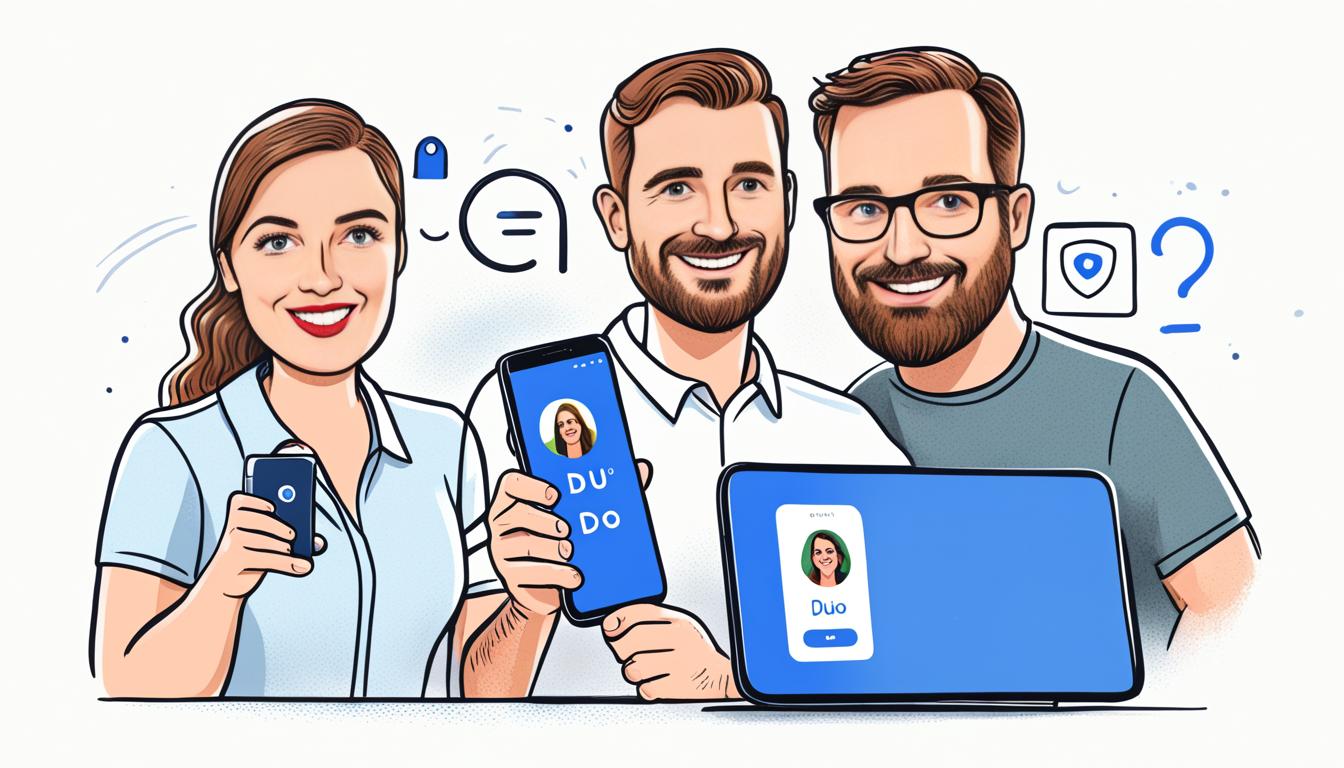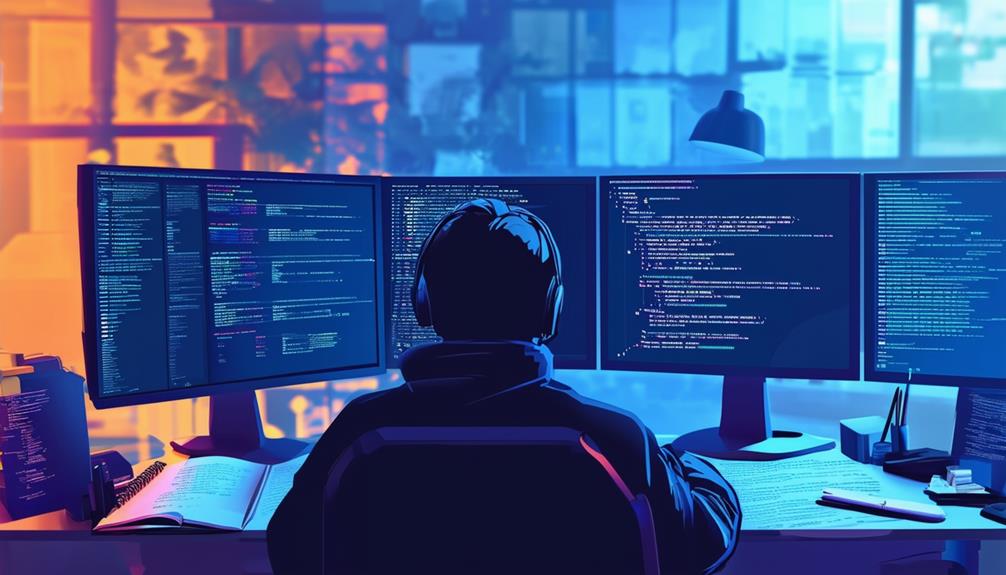Video calls have become a prime target for hackers. With more people chatting online, we need safe video call apps. This article examines Google Duo, its safety, and how it protects your chats.
Google Duo focuses on your security and privacy. It does more than basic apps to keep your calls safe. It uses many security layers to protect you from hackers.
Let’s check out Google Duo’s security insights. We’ll see how it keeps video calls private with encryption and other security steps. Learn how it guards your calls.
Key Takeaways:
- Video calls are increasingly targeted by hackers.
- Google Duo is a leading video calling app with robust security features.
- Google…
Robust Security
Google Duo focuses strongly on keeping user communications safe. It offers powerful features for privacy and protection. One important security step is end-to-end encryption. This means no one but the people in the conversation can see the content. This keeps hackers from seeing or stealing the information.
Google Duo also uses verification steps for extra safety. For example, two-factor authentication asks for a second proof of identity, like a code, along with your password. This stops unwanted access to accounts and makes things safer.
The Knock Knock feature of Google Duo adds more security. It lets you see a live video of the caller before you answer. This makes sure you’re only talking to people you trust and stops fakes.
Google Duo believes in keeping minimal data. It does not keep call logs or video call info forever. This lowers the chance of sensitive info getting exposed or accessed wrongly.
Security Features Google Duo Implements End-to-End Encryption ✓ Verification Mechanisms ✓ Knock Knock Feature ✓ Data Minimization ✓ Consistent Security Standards ✓ Reliable Infrastructure ✓ Google Duo keeps the same security rules for both iOS and Android. This gives everyone a safe and uniform experience, no matter the device. It’s also built on strong and reliable tech. This means calls are stable and safe for a better user experience.
Google Duo is all about strong security for video calls. It uses end-to-end encryption, verification, data protection, and keeps high standards for safety. This makes sure your calls stay private and secure.
Ensuring Privacy
Privacy is very important when you’re on video calls. Google Duo gets this. It has put many measures in place to keep your chats secure and private.
End-to-end encryption is a big deal with Google Duo. It means only the people in the video call can see what’s shared. No one else can peek into your conversations, thanks to this technology.
Google Duo makes sure your calls are safe using secure protocols. This blocks any sneaky attempts to listen in or interrupt your calls.
There’s a cool feature with verification codes too. It checks who’s joining your call to stop any fakers. It’s a smart way to keep your calls with just the people you want.
Want to share your screen? Google Duo has screen sharing controls. You decide what others see. This keeps any private stuff hidden during your call.
With privacy settings, you’re in charge of who can call you and see when you’re available. It makes it easier to talk only with people you trust.
There’s also two-step verification for extra safety. Turning this on means you’ll need a special code to get into your account. It’s another layer to keep your stuff secure.
Google Duo works hard to make sure your video calls are safe. Your personal info stays protected with all these privacy steps.
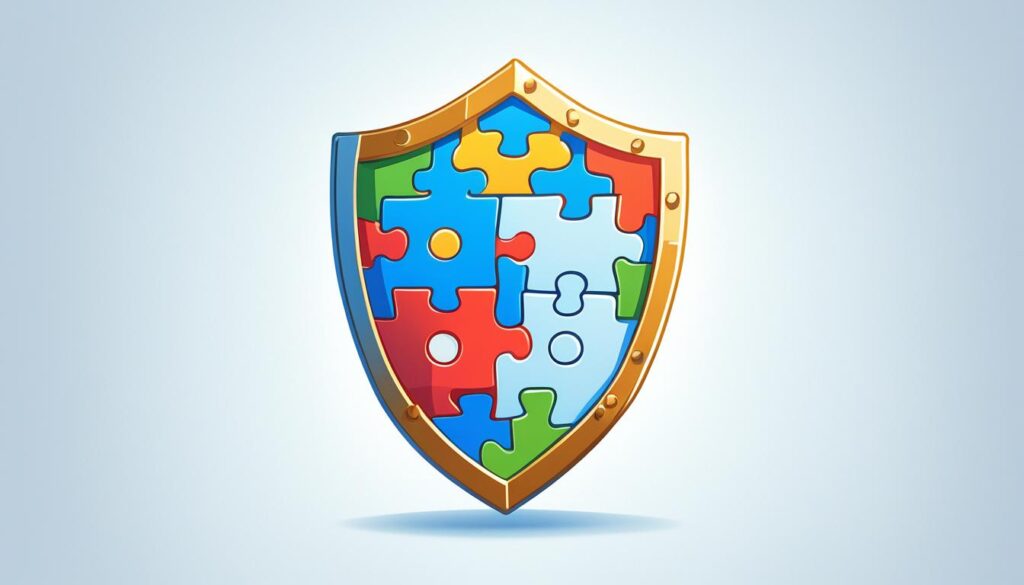
Table of Google Duo Privacy Features
Privacy Feature Description End-to-End Encryption Ensures only participants can access call content Secure Protocols Establishes secure connections to prevent unauthorized access Verification Codes Verifies participant identities, prevents impersonation Screen Sharing Controls Allows users to choose what to share, protecting sensitive information Privacy Settings Provides control over who can contact and see availability status Two-step Verification Requires additional code for account access, enhancing security Why Choose Google Duo for Video Calls?
Google Duo shines when it comes to video calls, offering an outstanding experience. Its interface is easy to use, working well on both Android and iOS devices. This ensures smooth talks, no matter the device you use.
The app focuses on providing high-quality video and audio. You can connect with anyone clearly, whether it’s family, colleagues, or friends. Google Duo automatically adjusts to your network condition. This means you get a great picture, even on slower internet.
Security with Google Duo is top-notch, thanks to end-to-end encryption. Your calls are safe from outsiders. This keeps your conversations private and secure.
“Google Duo is my go-to app for video calls. The interface is so simple and intuitive, and the video and audio quality are top-notch. Plus, knowing that my calls are encrypted gives me that extra sense of security.” – Amy Thompson, satisfied Google Duo user
Google Duo also stands out for its ease of use. Making a call is as simple as tapping a button. You can quickly start chatting face-to-face. It’s also great for group video calls, making gatherings or meetings easy to manage.
With all these benefits, Google Duo is a top choice for video calling. It combines ease, quality, and security. These features make it the go-to app for all your video chats.
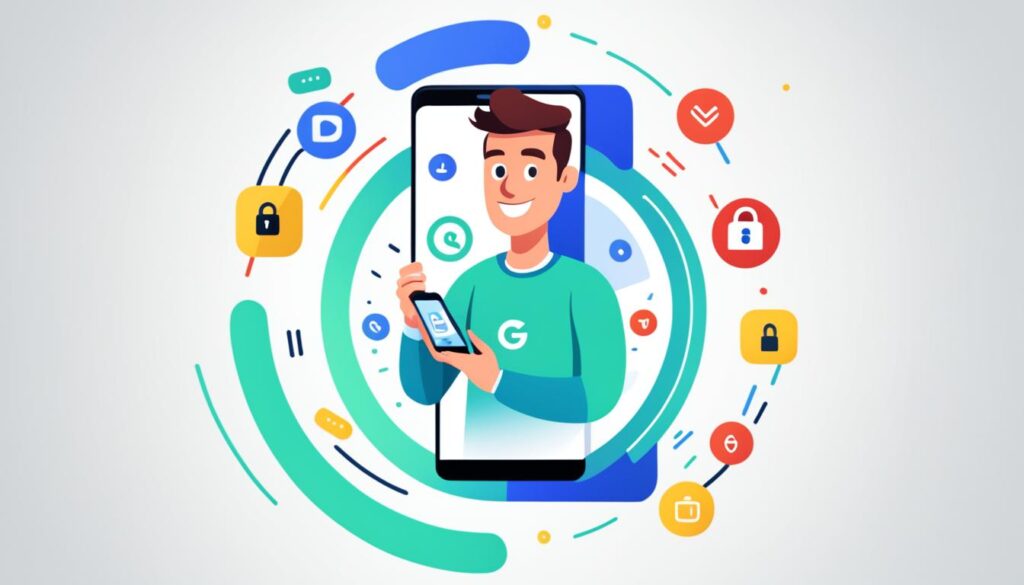
Reasons to Choose Google Duo Seamless compatibility with Android and iOS devices High-quality video and audio, dynamically adjusted based on network conditions End-to-end encryption for secure and private conversations User-friendly interface for easy navigation and use Support for group video calls Making Video Calls with Google Duo: A Step-by-Step Guide
Making video calls with Google Duo is simple. Just follow these steps to start talking with friends, family, and colleagues:
- Set up Google Duo: First, download the Google Duo app from the App Store or Google Play Store. Then, sign in with your Google account to begin.
- Add contacts: Sync your contacts with Google Duo to easily find and call them. Or, you can type in phone numbers to add new people.
- Initiate a video call: To call someone, pick a contact from your Google Duo list. Press the video call button beside their name to start the call.
- Enjoy additional features: Google Duo has lots of cool features. You can make calls with a group of people. Even in low light, you’ll see each other well. Plus, Google Duo works on both Android and iOS devices.
Google Duo lets you easily stay in touch with important people in your life. Begin video calling today and enjoy how easy and reliable it is.

Strength in Layers: Creating a Secure Line of Defense Against Phishing
Phishing is a big threat to cybersecurity. It’s crucial to have a secure defense against these attacks. Implementing multiple security layers helps strengthen protection against phishing. Each layer adds to the overall defense.
MFA is a key tool in this battle. It requires an extra step beyond a password for user verification. This extra layer can stop unauthorized access to important data. It makes sure that only the right people can access valuable information.
At the University of Queensland, Duo’s MFA solution shows how effective this approach can be. The university added Duo’s MFA to their IT setup. This boosted their defense against phishing for both students and staff.
Duo’s MFA is easy for everyone to use, even without much tech knowledge. Its simple setup and use process make it a strong defense against phishing.
MFA and Other Security Practices: A Comprehensive Defense
MFA works best when used with other security steps. It’s part of a bigger plan to fight phishing that includes:
- Teaching employees and users about phishing to help them spot and avoid threats.
- Using strong, unique passwords and changing them often to reduce attack risk.
- Filtering and watching emails closely to catch and stop phishing emails early.
- Keeping an eye on network activity and learning about new phishing threats for better defense.
Combining these practices with MFA creates a strong defense. It protects against phishing and lowers the chance of data breaches.
“To fight phishing, we need many layers of security, including MFA. It stops unauthorized access and keeps data safe.” – Security Expert
Duo’s Strength in Layers: A Holistic Approach to Security
Duo knows how important multi-layered security is against phishing. Their MFA fits well with existing IT systems and strengthens defenses. By using Duo’s MFA, organizations can improve their security and protect their data.
To show how important different security layers are, here’s a table. It shows each layer’s role in defending against phishing:
Layers of Security Role in Defense Against Phishing Multi-Factor Authentication (MFA) Adds an extra verification step, minimizing the risk of unauthorized access. Security Awareness Training Educates employees about phishing techniques, empowering them to identify and respond appropriately to potential threats. Strong Password Policies Enforces the use of complex, unique passwords that are harder for hackers to crack. Email Filtering and Monitoring Detects and blocks phishing emails, reducing the chances of users falling victim to phishing attacks. Continuous Monitoring and Threat Intelligence Provides real-time insights into potential phishing threats, enabling organizations to take proactive defense measures. 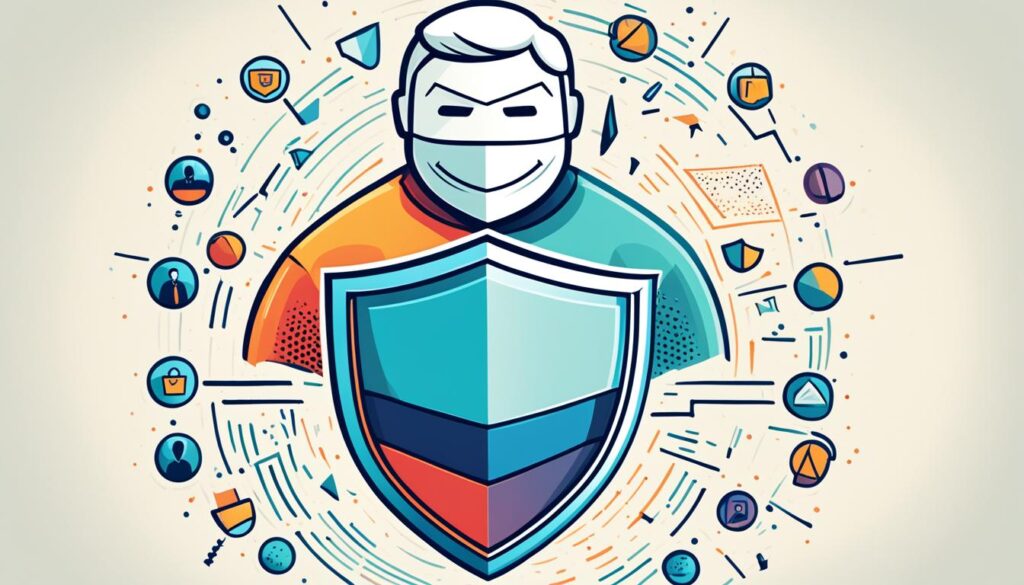
By using these security layers, organizations can build a strong defense. This improves their fight against phishing and secures their data.
Ensuring Privacy and Security
Video calling apps must keep your chats private and secure. Google Duo does this well, giving you peace of mind. Your talks are safe with its strong security features.
Google Duo uses end-to-end encryption for your calls and chats. This means nobody but you and the person you’re talking to can see the conversation. It keeps your privacy safe.
Google Duo makes a secure connection between devices. This stops others from sneaking into your calls. It keeps your conversations private.
Google Duo also uses verification codes for extra security. This helps you know the people you’re talking to are who they say they are. It reduces the risk of imposters.
You can control what you share with Google Duo’s screen sharing. Only show what you want to, keeping sensitive info safe. This feature lets you share wisely.
With Google Duo, you decide who can reach you and see when you’re available. You can set your privacy the way you like it. This lets you manage your contacts and availability.
Google Duo boosts security with two-step verification. This extra step makes sure only you can enter your account. Only people with the right code can access your Google Duo account.
Google Duo puts privacy and security first. With encryption, secure connections, and more, you can talk freely. You’ll feel secure, knowing your information is safe.
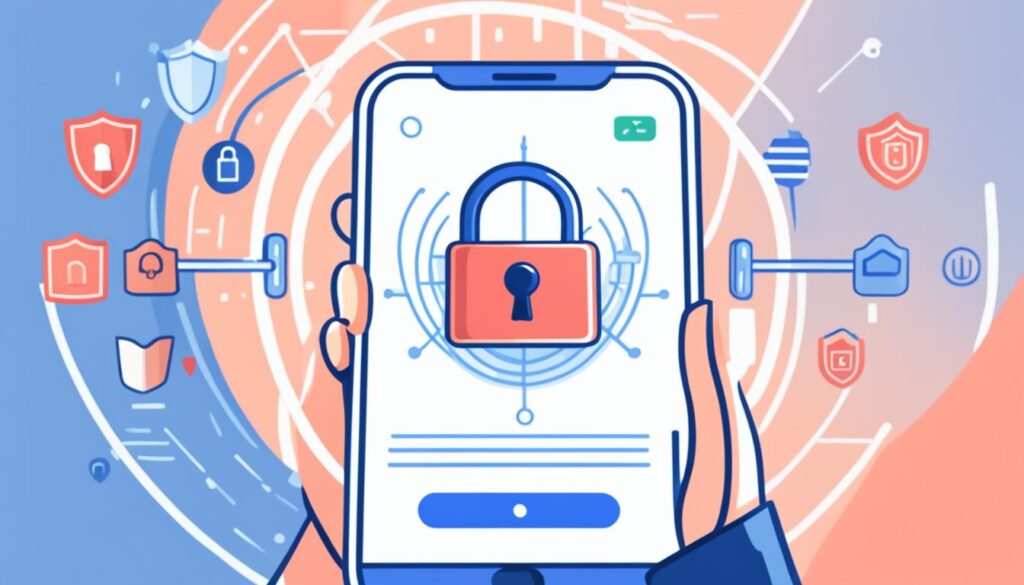
Examples of Use Cases
Google Duo is great for both personal and work talks. It offers many ways to use it.
1. Connecting with Family Members Abroad
Google Duo is perfect for staying in touch with family who live far away. You can catch up or share big moments with it. Its video calling makes you feel closer, despite the distance.
2. Conducting Remote Interviews for Businesses
Google Duo is also useful for businesses doing online interviews. Its high-quality video and audio make chats clear and smooth. This ensures interviews go well, no matter where people are in the world.
3. Maintaining Long-Distance Relationships
Long-distance relationships are hard, but Google Duo makes it easier. It gives a way to keep in touch closely. Video calls help share experiences, keeping the emotional bond strong.
4. Facilitating Virtual Classes or Tutoring Sessions
For teaching or learning online, Google Duo is helpful. It lets teachers and students interact like they’re face-to-face. Features like screen sharing make learning together easy.
Google Duo suits many needs, from chatting with family to online learning. It’s versatile and easy to use for various situations.
Conclusion
Google Duo is a secure and trustworthy video call app. It focuses on keeping your calls private and safe. With end-to-end encryption and checks, it protects your talks from hackers.
To make video calls with confidence, follow the guide and use its strong security. Google Duo is perfect for staying in touch, remote interviews, or online classes. It’s easy to use, with great video and sound, while keeping your calls private.
Google Duo lets you call with ease and ensures your safety. You can video call knowing your privacy is secure.
FAQ
Is Google Duo safe from hackers?
Yes, Google Duo is safe. It has strong security like end-to-end encryption and secure connections. These keep your calls private.What security measures does Google Duo have?
Google Duo protects your calls with end-to-end encryption, verification, and the Knock Knock feature. It also focuses on minimizing data use and cross-platform security.How does Google Duo prioritize privacy?
Google Duo keeps your calls private with end-to-end encryption and secure connections. It also uses verification codes and gives you control over screen sharing.Why should I choose Google Duo for video calls?
Google Duo is easy to use on Android and iOS, with high-quality video and audio. It’s also very secure.How do I make video calls with Google Duo?
To use Google Duo, download the app and sign in with a Google account. Then, add contacts to start video calling. It also has group calls and low-light mode.How can I create a secure line of defense against phishing?
Protect yourself from phishing by using layers of security like multi-factor authentication (MFA). Duo’s MFA is a good way to stop unauthorized access.How does Google Duo ensure privacy and security?
Google Duo ensures your privacy with end-to-end encryption and secure connections. You also get verification codes and screen sharing controls for extra safety.What are some examples of use cases for Google Duo?
You can use Google Duo to stay in touch with family abroad, hold remote interviews, keep up long-distance friendships, and run virtual classes.What is the conclusion about Google Duo’s security and privacy?
Google Duo is a trusted app for video calling that puts your privacy first. Its strong security features, like end-to-end encryption, protect you from hackers.
